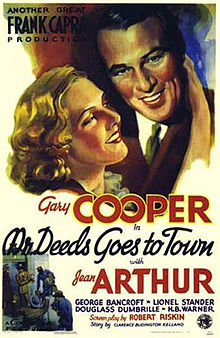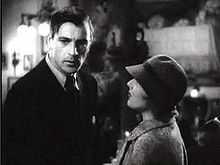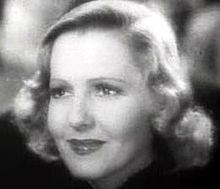- Mr. Deeds Goes to Town
-
Mr. Deeds Goes to Town 
Theatrical release posterDirected by Frank Capra Produced by Frank Capra Written by Clarence Budington Kelland (story)
Robert Riskin (screenplay)Starring Gary Cooper
Jean ArthurCinematography Joseph Walker Editing by Gene Havlick Distributed by Columbia Pictures Release date(s) April 16, 1936 Running time 115 minutes Country United States Language English Mr. Deeds Goes to Town is a 1936 American screwball comedy film directed by Frank Capra, and starring Gary Cooper and Jean Arthur in her first featured role. Based on the story "Opera Hat" by Clarence Budington Kelland, which appeared in serial form in the Saturday Evening Post, the screenplay was written by Robert Riskin in his fifth collaboration with Frank Capra.[1][2][3]
Contents
Plot
During the Great Depression, Longfellow Deeds (Gary Cooper), the co-owner of a tallow works, part-time greeting card poet, and tuba-playing inhabitant of the hamlet of Mandrake Falls, Vermont, inherits 20 million dollars from his late uncle, Martin Semple. His uncle's scheming attorney, John Cedar (Douglass Dumbrille), locates Deeds and takes him to New York City. Cedar gives his cynical troubleshooter, ex-newspaperman Cornelius Cobb (Lionel Stander), the task of keeping reporters away from Deeds. Cobb is outfoxed, however, by star reporter Louise "Babe" Bennett (Jean Arthur), who appeals to Deeds' romantic fantasy of rescuing a damsel in distress by masquerading as a poor worker named Mary Dawson. She pretends to faint from exhaustion after "walking all day to find a job", and worms her way into his confidence. Bennett proceeds to write a series of enormously popular articles mocking Longfellow's hick ways and odd behavior, giving him the moniker "Cinderella Man".
Cedar tries to get Deeds's power of attorney in order to keep his financial misdeeds secret. Deeds, however, proves to be a shrewd judge of character, easily fending off Cedar and other greedy opportunists. He wins Cobb's wholehearted respect and eventually Babe's love. However, when Cobb finds out Bennett's true identity, Deeds is left heartbroken.
Just as Deeds is ready to return to Mandrake Falls in disgust, a dispossessed farmer (John Wray) breaks into his mansion and threatens him with a gun. He expresses his scorn for the seemingly heartless, ultra-rich man, who won't lift a finger to help the multitudes of desperate poor. After the intruder comes to his senses, Deeds realizes what he can do with his troublesome fortune. He decides to provide fully equipped 10-acre farms free to thousands of homeless families if they will work the land for several years.
Alarmed at the prospect of losing control of the fortune, Cedar joins forces with Deeds' only other relative and his grasping, domineering wife in seeking to have Deeds declared mentally incompetent. Along with Babe's betrayal, this finally breaks Deeds' spirit and he sinks into a deep depression. A sanity hearing is scheduled to determine who should control the Deeds' fortune.
During his sanity hearing, things look bleak for Deeds, especially since he initially refuses to defend himself. Cedar even gets Deeds's Mandrake Falls tenants—eccentric elderly sisters Jane and Amy Faulkner (Margaret Seddon and Margaret McWade)—to testify that Deeds is "pixilated", meaning odd like a pixie. That charge falls apart when the two spinsters, when questioned as to who else is pixilated, reply, "Why everyone, but us." After Babe convinces Deeds that she truly loves him, he systematically punches holes in Cedar's case—before actually punching Cedar in the face—and the judge declares him to be "the sanest man who ever walked into this courtroom."[1]
Cast
- Gary Cooper as Longfellow Deeds
- Jean Arthur as Louise "Babe" Bennett/ Mary Dawson
- George Bancroft as MacWade
- Lionel Stander as Cornelius Cobb
- Douglass Dumbrille as John Cedar
- Raymond Walburn as Walter
- H.B. Warner as Judge May
- Ruth Donnelly as Mabel Dawson
- Walter Catlett as Morrow
- John Wray as Farmer[1]
Production
Originally, Frank Capra intended to make Lost Horizon after Broadway Bill (1934), but lead actor Ronald Colman couldn't get out of his other filming commitments. So Capra began adapting Mr. Deeds Goes to Town. The two main cast members, Gary Cooper as Longfellow Deeds and Jean Arthur as Louise "Babe" Bennett/Mary Dawson, were cast as production began. Capra's "first, last and only choice" for the pivotal role of the eccentric Longfellow Deeds was Gary Cooper.[4] Due to his other film commitments, production was delayed six months before Cooper was available, incurring costs of $100,000 for the delay in filming.[5]
Arthur was not the first choice for the role, but Carole Lombard, the original female lead, "ankled" the film just three days before principal photography, in favor of a starring role in My Man Godfrey.[6] The first scenes shot on the Fox Studios' New England street "lot" were in place before Capra "discovered" his heroine in a rush screening.[7] The opening sequences had to be reshot when Capra decided against the "broad" comedy approach that had originally been written.[6]
Despite his penchant for coming in "under budget," Capra spent an additional five shooting days in multiple takes, testing angles and "new" perspectives, treating the production as a type of workshop exercise. Due to the increased shooting schedule, the film came in at $38,936.00 more than the Columbia budget for a total of $806,774.00.[8] Throughout the pre-production and the early principal photography, the project still retained Kelland's original title, Opera Hat, although Capra tried out some other titles including A Gentleman Goes to Town and Cinderella Man before settling on a name that was the winning entry in a contest held by the Columbia Pictures publicity department.[9]
Reception
The film was generally treated as likable fare by critics and audiences alike. Noted reviewer Graham Greene was effusive that this was Capra's finest film to date, describing Capra's treatment as "a kinship with his audience, a sense of common life, a morality..." [10] Variety noted "a sometimes too thin structure [that] the players and director Frank Capra have contrived to convert (...) into fairly sturdy substance."[11]
This was the first Capra film to be released separately to exhibitors and not "bundled" with other Columbia features.On paper, it was his biggest hit, easily surpassing It Happened One Night.[12]
American Film Institute recognition
- 2000: AFI's 100 Years... 100 Laughs #70
- 2006: AFI's 100 Years... 100 Cheers #83
Awards
Capra won his second Academy Award for Directing in 1936 for Mr. Deeds Goes to Town, while Cooper received the first of his five nominations for Best Actor. The film was also nominated for Best Picture, Best Screenplay (Robert Riskin), and Best Sound Recording (John P. Livadary).[13]
At the end of the year, the New York Film Critics and the National Board of Review named "Mr. Deeds" the "Best Picture of 1936."[14]
Adaptations
A radio adaptation of the film was originally broadcast on February 1, 1937 on Lux Radio Theater. In that broadcast, Gary Cooper, Jean Arthur and Lionel Stander reprised their roles from the 1936 film.[15]
A short-lived ABC television series of the same name ran from 1969 to 1970, starring Monte Markham as Longfellow Deeds. It was also remade as Mr. Deeds in 2002, starring Adam Sandler and Winona Ryder.
A mistaken belief is that a sequel called Mr. Deeds Goes to Washington was written and eventually became Mr. Smith Goes to Washington. Although the latter has some similarities to Mr. Deeds Goes to Town, including starring Jean Arthur and being directed by Capra, its 1939 screenplay was actually based on an out-of-print novel, The Gentleman from Montana and was an entirely unique and unrelated project.[16]
Popular culture
The bucolic Vermont town of Mandrake Falls, home of Longfellow Deeds, is now considered an archetype of small town America with Kelland creating a type of "cracker-barrel" view of rural values contrasted with that of sophisticated "city folk".[17][18] The word "pixilated,"' previously limited to New England (and attested there since 1848), "had a nationwide vogue in 1936" thanks to its prominent use in the film;[19] although its use in the screenplay may not be an accurate interpretation.[N 1]
The lyrics to the 1977 Rush song "Cinderella Man" on the A Farewell to Kings album are based on the story of Mr. Deeds Goes to Town.
References
- Notes
- ^ A correspondent to Notes and Queries in 1937 objected to the screenplay's use of "pixilated" to mean "crazy", saying instead that "A 'pixilated' man is one whose whimseys [sic] are not understood by practical-minded people." Quoted in the Oxford English Dictionary, 2nd ed. (1989), s.v. "Pixilated".
- Citations
- ^ a b c "Mr. Deeds Goes to Town," IMDB. Retrieved: November 16, 2011.
- ^ Poague 1975, p. 17.
- ^ McBride 1992, p. 332.
- ^ McBride 1992, p. 342.
- ^ Capra 1971, p. 184.
- ^ a b Scherle and Levy 1977, p. 137.
- ^ Capra 1971, p. 184.
- ^ McBride 1992, p. 346.
- ^ McBride 1992, p. 328.
- ^ Greene, Graham. "Mr. Deeds." The Spectator, August 28, 1936.
- ^ "Mr. Deeds Goes to Town." Variety. Retrieved: February 21, 2008.
- ^ McBride 1992, p. 348.
- ^ "The 9th Academy Awards (1937) Nominees and Winners."oscars.org. Retrieved: 9 August 2011.
- ^ McBride 1992, p. 349.
- ^ Haendiges, Jerry. "Jerry Haendiges Vintage Radio Logs - Lux Radio Theater." otrsite.com. Retrieved: October 18, 2009.
- ^ Capra 1971, p. 254.
- ^ McBride 1992, p. 333.
- ^ Levy, Emanuel. "Political Ideology in Capra's Mr. Deeds Goes to Town." emanuellevy.com. Retrieved: February 26, 2008.
- ^ Eckstorm, Fannie Hardy. "Pixilated, a Marblehead Word", American Speech, Vol. 16, no. 1, February 1941, pp. 78–80.
- Bibliography
- Capra, Frank. Frank Capra: The Name Above the Title: An Autobiography. New York: The Macmillan Company, 1971, ISBN 0-306-80771-8.
- Michael, Paul, ed. The Great Movie Book: A Comprehensive Illustrated Reference Guide to the Best-loved Films of the Sound Era. Englewood Cliffs, New Jersey: Prentice-Hall Inc., 1980. ISBN 0-13-363663-1.
- McBride, Joseph. Frank Capra: The Catastrophe of Success. New York: Touchstone Books, 1992, ISBN 0-671-79788-3.
- Poague, Leland. The Cinema of Frank Capra: An Approach to Film Comedy. London: A.S. Barnes and Company Ltd., 1975, ISBN 0-498-01506-8.
- Scherle, Victor and William Levy. The Films of Frank Capra. Secaucus, New Jersey: The Citadel Press, 1977. ISBN 0-8065-0430-7.
External links
- Mr. Deeds Goes to Town at the Internet Movie Database
- Mr. Deeds Goes to Town at AllRovi
- Lux Radio Theater adaptation in the Internet Archive
Films directed by Frank Capra 1920s The Strong Man • For the Love of Mike • Long Pants • The Power of the Press • Say It with Sables • So This Is Love? • Submarine • The Way of the Strong • That Certain Thing • The Matinee Idol • Flight • The Donovan Affair • The Younger Generation
1930s Rain or Shine • Ladies of Leisure • Dirigible • The Miracle Woman • Platinum Blonde • Forbidden • American Madness • The Bitter Tea of General Yen • Lady for a Day • It Happened One Night • Broadway Bill • Mr. Deeds Goes to Town • Lost Horizon • You Can't Take It with You • Mr. Smith Goes to Washington
1940s 1950s 1960s AFI's 100 Years...100 Laughs 1–10 11–20 The Producers • A Night at the Opera • Young Frankenstein • Bringing Up Baby • The Philadelphia Story • Singin' in the Rain • The Odd Couple • The General • His Girl Friday • The Apartment
21–30 31–40 41–50 51–60 61–70 What's Up, Doc? • Sherlock, Jr. • Beverly Hills Cop • Broadcast News • Horse Feathers • Take the Money and Run • Mrs. Doubtfire • The Awful Truth • Bananas • Mr. Deeds Goes to Town
71–80 Caddyshack • Mr. Blandings Builds His Dream House • Monkey Business • Nine to Five • She Done Him Wrong • Victor Victoria • The Palm Beach Story • Road to Morocco • The Freshman • Sleeper
81–90 91–100 The Heartbreak Kid • Ball of Fire • Fargo • Auntie Mame • Silver Streak • Sons of the Desert • Bull Durham • The Court Jester • The Nutty Professor • Good Morning, Vietnam
Categories:- 1936 films
- American films
- English-language films
- 1930s comedy films
- American comedy-drama films
- American romantic comedy films
- American screwball comedy films
- Black-and-white films
- Columbia Pictures films
- Films based on short fiction
- Films directed by Frank Capra
- Films set in New York City
- Films set in Vermont
- Films whose director won the Best Director Academy Award
Wikimedia Foundation. 2010.


